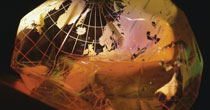COLOUR IT GREEN!
End of the Affair:
Plastic Bags Lose Their Luster
by Sheryl Eisenberg

Nearly 75 years ago, soft plastic ranked up there with the Mona Lisa and Tower of Pisa as one of civilization’s masterpieces, at least according to Cole Porter in his masterpiece, “You’re the Top.” Feelings have changed a bit since then.
While plastic remains the ne plus ultra as far as convenience is concerned, people are not so thrilled with its nasty habit of never, ever going away. Plastic bags, in particular, have come in for a lashing because of the way they litter the streets, get tangled in treetops, choke sea turtles and other animals who mistake them for food, clog municipal sewage systems and, once in landfills, refuse to decompose.
What we have here is yet another love-hate relationship that we do not have the strength to end. As a result, governments at all levels around the world have found it necessary to step into the breach to save us from ourselves.
Australia, Bangladesh, Italy, Ireland, South Africa, and Taiwan are among the countries trying voluntary programs, taxes, and bans to get the problem under control. American cities have also gotten into the act. The first was San Francisco, which outlawed plastic bags at large grocery stores and pharmacies in 2007. Well, that’s not so surprising, San Francisco being San Francisco, but this past July, Los Angeles voted for a ban beginning in 2010 if the state fails to move ahead with a 25-cent fee on shoppers requesting plastic bags. Westport, Connecticut, joined the club in September.
Most recently, New York City’s Mayor Bloomberg proposed a six-cent plastic bag tax (or fee, as he would have it, to avoid having to get approval by the state legislature). The city has been abuzz ever since. Some people say it’s time; others wonder how they’ll ever survive.
I’m a New Yorker and I couldn’t be happier. I only wish the city would tax paper bags, too, since they have their own drawbacks. As the plastics industry is oh-so-quick to point out, they contribute even more to global warming than plastic bags and take up more room in landfills when not recycled. On the other hand, they generally are recycled and then turned into fresh paper, whereas plastic bags are rarely recycled and even more rarely turned into something new. Moreover, when the wind starts blowing, paper bags are much less likely to take off. Paper never causes much of a litter problem anyway since it biodegrades, unlike you-know-what.
But this argument is beside the point because “paper or plastic?” is a trick question whose answer is “reusable.” Now that you know, don’t wait for a plastic bag tax or ban to come to your town. Go ahead and break the disposable habit on your own.
No need to buy expensive bags for the purpose. Any old canvas totes you happen to have will do. Stick one in your purse or backpack and a few in the trunk of your car if you drive so you’ll always be prepared. If you have a problem remembering to take them out of the trunk when you get to the store, as I’ve heard some people do, tape a reminder to the dashboard. Ugly, yes, but that’s what will make it so hard to miss.
Perhaps you’re reluctant to take this step because you have a dog who needs picking up after. If so, see my discussion online of how to handle the dog poop quandary (www.nrdc.org/thisgreenlife/0801.asp).
That leaves garbage disposal. In all likelihood, you will still need some kind of plastic bags for that (but probably the heavy-duty variety which is less likely to cause a littering problem—especially when weighed down with garbage). However, you can minimize the need by reducing your trash. Here’s how:
- Avoid buying overly-packaged products;
- Reuse what you can before disposing of it;
- Give away what you no longer want to reuse;
- Don’t overbuy perishable food items;
- Use older vegetables and bones for stock;
- Compost food scraps and yard waste.
When you find yourself pining for the convenience of yore, think about the last time you spotted a plastic bag where one never should be—at the beach, in the woods, in the mountains, or in your yard—and I bet you’ll feel convenience isn’t all it’s cracked up to be.
This article has been reprinted with permission of Natural Resources Defense Council (NRDC), which has long been known as America’s most effective environmental action organization. Subscribe free or visit past monthly issues of This Green Life at www.nrdc.org/thisgreenlife.
Sheryl Eisenberg, a long-time advisor to NRDC, posts a new This Green Life every month. She makes her home in Tribeca (NYC), where—along with her children, Sophie and Gabby, and husband, Peter—she tries to put her environmental principles into practice. No fooling. She is also a web developer and writer. With her firm, Mixit Productions (mixitproductions.com), she brought NRDC online in 1996 and designed their first websites. She created and, for several years, wrote the Union of Concerned Scientists’ green living column, Greentips, and has designed and contributed content to many nonprofit sites. |
